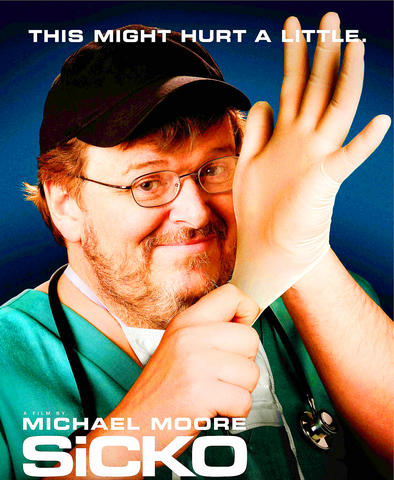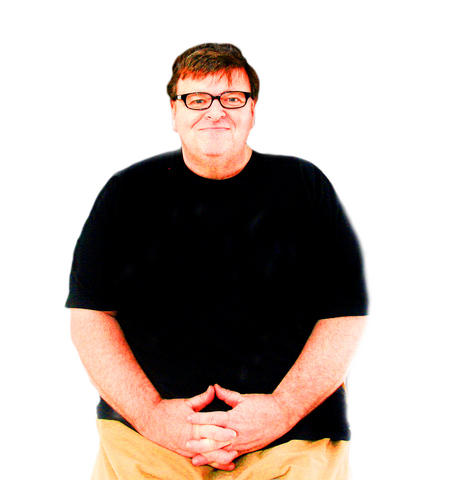In making SiCKO, his new documentary about US health care, Michael Moore assumed the public knows it needs improvement but doesn't fully realize why. So he argues that the US' health care suffers badly in comparison to other countries - costing twice as much for results that are no better and often worse - and basically asks, "Don't we deserve better?"
"I really want to make a contribution to the national debate on this issue," Moore said. The movie's national release Friday was limited after it sold out in all 44 of its previews.
Moore's audience is likely receptive to his diagnosis, if not his prescription "to take the profit motive out of health care." In a CBS News/New York Times poll last year, 34 percent said the health care system should be completely rebuilt and 90 percent wanted at least fundamental change. In last month's Kaiser Family Foundation poll, health care was the top domestic priority for presidential candidates, second overall to Iraq.

PHOTOS: AP AND REUTERS
SiCKO already has spun off Scrubs for SiCKO, with doctors' and nurses' groups advocating universal, single-payer health care (www.guaranteedhealthcare.org), and www.FreeMarketCure.com, with articles and short films favoring private-market solutions. YouTube, Oprah.com and other sites are soliciting tales of woe.
Moore has been rave-reviewed on foxnews.com, pirated on the Internet and warned of possible federal prosecution for taking Sept. 11 rescue workers to Cuba for medical care they couldn't afford at home.
Even many of his allies have bemoaned the Cuba trip for hurting their cause more than helping it. As always, Moore exaggerates, overly generalizes, ignores opposing viewpoints and raises doubts about how much he should be believed.

Several years of solid research on US health care can help viewers draw their own conclusions about Moore's contentions.
Do we really spend twice as much on health care as the rest of the developed world?
Not twice as much as everyone. But at a per-capita cost of US$6,102 in 2004, US health care more than doubled the expenditures in 19 of 29 other developed countries in Organization for Economic Cooperation and Development (OCED) data.
On the individual level, health insurance premiums rose by 58.5 percent, after inflation, from 2000 to 2006, while wages increased by just 1.7 percent.
That extra spending often doesn't even improve health, said Mark McClellan, who directed the Food and Drug Administration and then Medicare-Medicaid in 2002-07. "We know that much of the spending is going to treatments that are unnecessary or lead to medical errors, so we're not getting nearly as much value as we should."
But don't the high taxes in other countries cancel out the differences?
Those figures include both private and public (tax) expenditures. Americans even spend more tax dollars on health care than the other OCED countries, where taxes pay for universal coverage. We spend 10 percent more than high-taxing France and about US$10 for every US$7 in the OCED median.
Does the US health system really rank 37th in the world, as Moore says?
Only in a seven-year-old report by the World Health Organization. It ranked the US first in the health services it delivers, but below 50th for overspending and making those with low incomes pay so much.
OCED comparisons are more useful. The Commonwealth Fund regularly compares six countries - the US, Canada, the UK, Australia, New Zealand and Germany - and consistently ranks the US last overall.
Ailing system
In the 2007 report's nine categories, the only US ranking above fifth was number one for the "right care," reflecting American superiority in acute illness and injury. But five US rankings were last - access, equity, efficiency, safe care and "long, healthy and productive lives."
For example, 34 percent of sicker Americans reported medical, drug or lab errors in the last two years, and the New England Journal of Medicine has concluded Americans get the recommended treatments only about half the time.
Even a UnitedHealthcare ad in March conceded the US health system "that was designed to make you feel better often just makes things worse." As Ezekiel Emanuel wrote in the May 16 Journal of the American Medical Association, "If a politician declares that the US has the best health care system in the world today, he or she looks clueless."
Is Cuba's socialized health care as good as Moore makes it out to be?
Not at all. It puts a relatively high priority on health, and prevents infectious diseases well for a resource-poor country, but the resources it lacks are basic. Shortages of syringes, antibiotics, aspirin, latex gloves, even light bulbs are widely described.
Although true of Cuba, "socialized medicine" is far more rare than the term is used. The UK is the only large, wealthy country where the doctors and other providers work for the government. Germany and others with universal coverage don't even use single-payer, where government replaces insurance companies.
Are Americans' life expectancy and infant-mortality rates as bad as Moore says?
They're well below average. Defenders of for-profit medicine point out that much of the problem is social justice rather than medical, since US rates are worst among minorities and those with low incomes.
Even so, Americans ranked 40th in 2005 with 6.4 infant deaths per 1,000 live births, nearly double the rates of France and Iceland. White infants alone wouldn't make the top 30.
Raw death rates aren't as useful as an OCED stat that asks, how many deaths would ideal health care have prevented? The US tied for 15th out of 19 countries in nine-year-old data, 53 percent behind France.
Costs are too high, but aren't most Americans happy with health care quality?
Health Affairs found 40 percent of Americans satisfied with their health care system in 2000. Seven countries were over 70 percent. Polling suggests the numbers haven't improved.
In a 2004 Commonwealth Fund survey, patients ranked US doctors last among the five English-speaking countries for listening, explaining and spending enough time with patients.
One problem is that doctors are rewarded "in our market-based system for a visit or a procedure, not for patients' health," said Carol Diamond, who directs the philanthropic Markle Foundation's health program. Moore said his biggest surprise was that other countries reward doctors for "keeping people well."
Expensive health
The result, as Jack Wennberg's Dartmouth University research shows, is that higher amounts of medical service generate not only higher costs, but also worse health. Giving the medical care to people who don't need it removes the benefit from risk-benefit equations.
"Up to one-third of our health care dollars are squandered on ineffective, sometimes unwanted, often unproven procedures," Wennberg told Maggie Mahar in her recent book, Money-Driven Medicine: The Real Reason Health Care Costs So Much.
Don't other countries have long waiting lists and rationing?
Yes, most other countries have longer waits to see specialists and have elective surgery. On the other hand, patients elsewhere are more apt to see doctors promptly when they're sick.
Cost tends to be the main US rationing tool. In the six-country study, sicker Americans were most likely to forgo medicine, doctor visits, tests and medical treatments because of cost. Most of the 51 percent who skipped at least one in 2005 had insurance.
Moore praises Canada, but aren't they always coming here for better health care?
Anecdotes aside, a 2002 Health Affairs study found "barely detectable" numbers of Canadians going to US border cities for treatment. In a 1996 Canadian survey, only 20 of 18,000 respondents crossed the border specifically for care.
Research comparing their quality favors Canada just slightly, Open Medicine reported in April. Even so, "Nobody in the US seriously proposes recreating the British or Canadian systems here," wrote The New Republic's Jonathan Cohn, author of Sick: The Untold Story of America's Health Care Crisis - And the People Who Pay the Price.
Do insurance companies really cancel sick people's policies?
California officials recently fined Blue Cross of California US$1 million for just that, and is investigating other companies.
It found violations in each of 90 randomly selected cancellations, of about 1,000 a year. But California insurers can't cancel policies without proving intent to deceive, which Money magazine said is not true of Ohio.
Is it true that in Canada, France and Great Britain, "Anyone can go to the hospital, can go to a doctor and never have to worry about paying a bill," as Moore says?
No. Even in the socialized UK, there are some out-of-pocket expenses, but Americans have more than most.
Americans spent US$5 out of pocket for every US$3 spent in OCED's median country in 2004. In 2005, 34 percent of sicker US adults spent at least $1,000 out of pocket, more than twice the percentage anywhere else in the six-country study.
The insured family selling all its possessions to pay medical bills in SiCKO is also extreme but plausible. "Medical debt is surprisingly common," Access Project officials wrote last year in Health Affairs, "affecting about 29 million nonelderly Americans, with and without health insurance." That's roughly one in six, and medical bills sent 44 percent of them through all or most of their savings.
As Cohn wrote in his review, "SiCKO got a lot of the little things wrong. But it got most of the big things right."
On the Net: www.michaelmoore.com.

Last week, the the National Immigration Agency (NIA) told the legislature that more than 10,000 naturalized Taiwanese citizens from the People’s Republic of China (PRC) risked having their citizenship revoked if they failed to provide proof that they had renounced their Chinese household registration within the next three months. Renunciation is required under the Act Governing Relations Between the People of the Taiwan Area and the Mainland Area (臺灣地區與大陸地區人民關係條例), as amended in 2004, though it was only a legal requirement after 2000. Prior to that, it had been only an administrative requirement since the Nationality Act (國籍法) was established in

Three big changes have transformed the landscape of Taiwan’s local patronage factions: Increasing Democratic Progressive Party (DPP) involvement, rising new factions and the Chinese Nationalist Party’s (KMT) significantly weakened control. GREEN FACTIONS It is said that “south of the Zhuoshui River (濁水溪), there is no blue-green divide,” meaning that from Yunlin County south there is no difference between KMT and DPP politicians. This is not always true, but there is more than a grain of truth to it. Traditionally, DPP factions are viewed as national entities, with their primary function to secure plum positions in the party and government. This is not unusual

The other day, a friend decided to playfully name our individual roles within the group: planner, emotional support, and so on. I was the fault-finder — or, as she put it, “the grumpy teenager” — who points out problems, but doesn’t suggest alternatives. She was only kidding around, but she struck at an insecurity I have: that I’m unacceptably, intolerably negative. My first instinct is to stress-test ideas for potential flaws. This critical tendency serves me well professionally, and feels true to who I am. If I don’t enjoy a film, for example, I don’t swallow my opinion. But I sometimes worry

US President Donald Trump’s bid to take back control of the Panama Canal has put his counterpart Jose Raul Mulino in a difficult position and revived fears in the Central American country that US military bases will return. After Trump vowed to reclaim the interoceanic waterway from Chinese influence, US Defense Secretary Pete Hegseth signed an agreement with the Mulino administration last week for the US to deploy troops in areas adjacent to the canal. For more than two decades, after handing over control of the strategically vital waterway to Panama in 1999 and dismantling the bases that protected it, Washington has